

Careers, Employability and Enterprise Centre : Journalism. Introduction The recent impact of the internet as a major news information provider has led to an exciting increase in diversity of career roles within this sector.
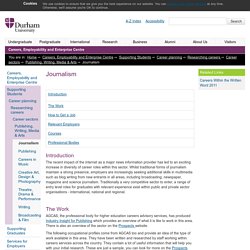
Whilst traditional forms of journalism maintain a strong presence, employers are increasingly seeking additional skills in multimedia such as blog writing from new entrants in all areas, including broadcasting, newspaper, magazine and science journalism. Traditionally a very competitive sector to enter, a range of entry level roles for graduates with relevant experience exist within public and private sector organisations - international, national and regional. The Work AGCAS, the professional body for higher education careers advisory services, has produced Industry Insight for Publishing which provides an overview of what it is like to work in this area. The following occupational profiles come from AGCAS too and provide an idea of the type of work available in this area. How to Get a Job What else could I do? Large employers. How to write your CV.
Your CV is all about marketing you to a potential employer.
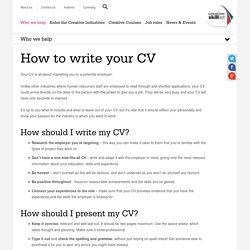
Unlike other industries where human resources staff are employed to read through and shortlist applications, your CV could arrive directly on the desk of the person with the power to give you a job. They will be very busy and your CV will have only seconds to impress. Media work experience: organisations - Media - Advertising, media, marketing and PR - Employment sectors - Student careers and vacancies - Careers and vacancies. We have divided organizations into major categories here, but bear in mind that distinctions between types of media are increasingly blurred, for example there is demand for journalists to be multimedia-savvy, able to present to and occasionally edit film and write for print and online.
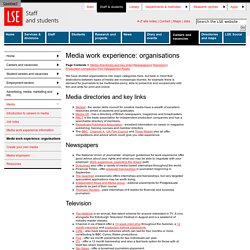
Media directories and key links Skillset - the sector skills council for creative media have a wealth of excellent resources aimed at students and graduates Media UK - has a directory of British newspapers, magazines and broadcasters. PACT is the trade association for independent production companies and has a searchable directory of members. Periodicals Publishers Association - excellent information on career in magazine publishing, training courses and member directory The BBC, Channel 4, UK Film Council and Three Weeks also all offer competitions and advice which could give you vital experience. Newspapers Television The Network is an annual, free talent scheme for anyone interested in TV. Film. Training schemes. Vacancies for our renowned graduate training scheme will be displayed on the Careers site, please check regularly for the latest opportunities.
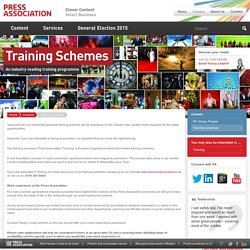
However, if you are interested in being a journalist, it is important that you have the right training. Our training business, Press Association Training, is Europe’s largest journalism and media training company. It runs foundation courses in news journalism, sports journalism and magazine journalism. The courses take place in our central London headquarters and news and sport is also run at our centre in Newcastle upon Tyne. If you are interested in finding out more about any of our training schemes, please go to our website www.becomeajournalist.co.uk or call us on: 0191 201 6043 Work experience at the Press Association For over a century generations of great journalists have started their careers at the Press Association and today we still give many people their first taste of life in the media through our work experience scheme. ProPublica.
Global21. How To Write a Good Feature. Wannabe writers often email the Student BMJ asking how to write a feature.
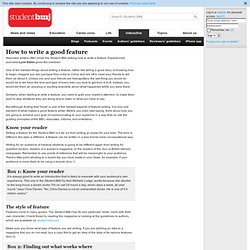
Experienced journalist Lynn Eaton gives the lowdown One of the hardest things about writing a feature, rather like telling a good story, is knowing how to begin. Imagine you are just back from a trip to China and are off to meet your friends to tell them all about it. Unless you and your friends are trainspotters, the last thing you would do would be to tell them the time and type of every train you took to get from A to B. New Journalism. Nan and Gay Talese in 2009.
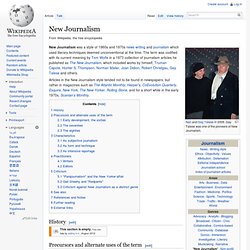
Gay Talese was one of the pioneers of New Journalism. New Journalism was a style of 1960s and 1970s news writing and journalism which used literary techniques deemed unconventional at the time. The term was codified with its current meaning by Tom Wolfe in a 1973 collection of journalism articles he published as The New Journalism, which included works by himself, Truman Capote, Hunter S. Thompson, Norman Mailer, Joan Didion, Robert Christgau, Gay Talese and others. History[edit] Precursors and alternate uses of the term[edit] Various people and tendencies throughout the history of American journalism have been labeled "new journalism".
During the sixties and seventies, the term enjoyed widespread popularity, often with meanings bearing manifestly little or no connection with one another. The Magic Writing Machine—Student Probes of the New Journalism, a collection edited and introduced by Everette E. Early development, the sixties[edit] The seventies[edit] Youth Journalism International. Journalist's Toolbox Update: Feb. 11, 2012 - The Journalist's Toolbox. Editorial contacts at The Solihull News and SolihullNews.net - Solihull News. If your enquiry is related to an editorial item in the newspaper or on our site, then the editorial contacts below will give you all the contact details you need. If you want to submit a story or letter for publication, you can do so by visiting the Send Your Story page and following the simple instructions. Ross Crawford David Irwin, Cathrina Hulse, Hannah Jennings Parry, Annette Belcher : Rebekah Borg {*style:<b>Telephone Numbers: </b>*}0121 234 5118 0121 234 5452 Website: www.solihullnews.net E-mail: solihull_news@mrn.co.uk {*style:<b>
Jobs: TV Work Experience. Check out the latest placements! At ITV, we’re always on the look-out for new talent.
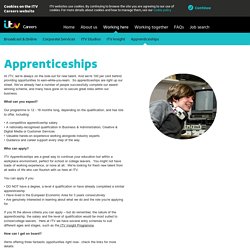
And we’re 100 per cent behind providing opportunities to earn-while-you-learn. So apprenticeships are right up our street.